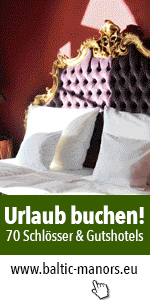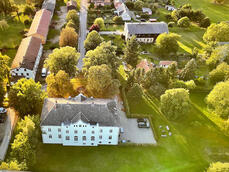Castle Hessenstein (Klein Roge)
In the fiefdom files of the Landeshauptarchiv in Schwerin (Main State Archive) Lütten Roge, as is was then called, is first documented in 1645. Since then the formerly approx. 600 hectare feudal estate, endowed with a seat in the state parliament, has had a long line of owners.
In 1704 the estate is mentioned among the properties of Ehrenoberst (Colonel-in-Chief) von Viereggen of Zierstorf. At the beginning of the 19th century ownership goes back and forth between the Counts von Hahn and the Counts von Hessenstein. Privy Councillor Otto Conrad Count von Hahn is owner of the estate in 1799, in 1803 it is owned by the Counts of Hessenstein, 1806 Count von Hahn of Remplin is again in possession, and from 1809 until 1827 once again the Counts of Hessenstein. This is the line of the so called `not of equal birth´ descendants of the Swedish King Friedrich I von Hessen-Kassel and his official mistress Countess Hedvig Ulrika Taube von Odenkat, a daughter of the Swedish Count and Admiral of the Realm Eberhard Diedrich Taube von Odenkat.
In 1827 the Counts von Hessenstein dispose of their entire properties, this being the estates of Zierstorf, Bartelshagen, Warnkenhagen and Klein Roge. New owner of Klein Roge becomes the commoner Heinrich Müller from Watzkendorf who however in this very year meets with a tragic fatal hunting accident. His sister marries Johann August Friedrich Wilhelm Held who was born in 1797 in Ankershagen, they continue the management of the estate. At that time it was said that Klein Roge was a grateful estate which would not let its owners down. Wilhelm Held is regarded a capable farmer and a helpful person. As the owner of an estate endowed with a seat in the state parliament he plays an active role in the Mecklenburg State Parliament.
As a member of the progressive liberal political camp of the bourgeois parliamentarians he frequently supports the oppositional politics of his estate neighbour Johann Daniel Georg Pogge auf Roggow. Pogge is a member of the Frankfurt Parliament and a close friend of Johann Heinrich von Thünen who later became an honorary citizen of the town of Teterow.
Wilhelm Held is substantially involved in the `Roggow Protocol of the 20th April 1848´ which demands improvement in the living conditions of the farm labourers. In 1866 he has the heretofore unimposing manor house rebuilt in a castle-like Tudor-Style. The work is carried out by the Wismar born Heinrich Gustav Thormann, star architect of this time. Thormann was a pupil of the `Berliner Bauschule´ studying under Wilhelm Stier and Friedrich August Stüler who were both students of Schinkel. Thormann creates a spacious two-storey rendered building which, standing slightly elevated behind a square of old lime trees, opens the view on to an outside staircase. On the courtside a central risalit with a triangular pediment and built in clock rises above the roof. In accordance with the taste of the age a park with a waterspout fountain and long yew hedges was established around the manor house.
Wilhelm Held dies in 1872. His heir is his son, Councillor of the Demesnes Wilhelm Held (II), who himself is a successful and passionate farmer. After he dies in 1906 Klein Roge is taken over by his son Wilhelm Held (III) who is just 25 years old. Wilhelm Held (III) was well known for his extremely kind nature and hospitality. He is the first, within a wide radius, to have a plant erected for the generation of electric energy. Furthermore he orders the building of several estate premises which are extant, as is the Building Hof Nr.3 which nowadays is a listed building.
The feudal lord Wilhelm Held (III) dies in 1921 due to his suffering with diabetes. As he was unmarried and without issue his sisters sell the estate. In 1925 Walter Domanski who originates from Prussia purchases the property and runs the estate up to the expropriation in 1945.
After World War II, from the summer 1946 on, the manor house is utilised as accommodation for refugees. On May, 1st 1955 a kindergarten is opened for use during harvesting times and a co-op (cooperative sales outlet) is located in the manor house from 1958 up to 1992. In 1964 the administration of the Groß Roge LPG (agricultural production cooperative) "Freiheit" moves into the manor house of Klein Roge. It will remain there together with the municipal office of Groß Roge until its termination in 1991.
In 1992 the administration of the community is taken over by the Amt Teterow-Land with its head office in the town of Teterow, merely the honorary mayor keeps his office in the manor house for a while. The parish parts company with the property in 1996 and sells it to a private individual. Following two further changes of ownership the manor house is now in new hands since 2017.
The new owners have the aim to lead "Lütten Roge" into a positive future in the spirit of the liberal-conservative as well as hospitable and helpful way of life which defined it over generations on end. Klein Roge together with its neighbour Mieckow, which is the former ancestral seat of the Counts von Zeppelin, as well as the localities of Groß Roge and Klein Köthel do nowadays belong to the parish of Teterow.
In case you have any further information regarding the history of Klein Roge, its residents, and its surroundings please write to: post@herrenhaus-klein-roge.de.
Structure of ownership prior to 1945:
| 1704 |
Colonel-in-Chief von Vieregge on Zierstorf |
| bis 1798 |
Bailiff Joh. Christian Hennings |
| 1798-1803 |
Privy Councillor Otto Conrad Graf von Hahn |
| 1803-1806 |
Count von Hessenstein |
| 1806-1809 |
Count Hahn zu Remplin |
| 1809-1827 |
Count von Hessenstein |
| 1827 |
Heinrich Müller |
| 1827-1925 |
Wilhelm Held |
| 1925-1945 |
Walter Domanski |
Schloss Hessenstein
17166 Klein Roge, Hof 1
Contact:
Jens Ohlrogge
Phone:
+49 172 / 40 110 23
Email:
infoSPAMFILTER@gutroge.de
Url: www.schloss-hessenstein.de




